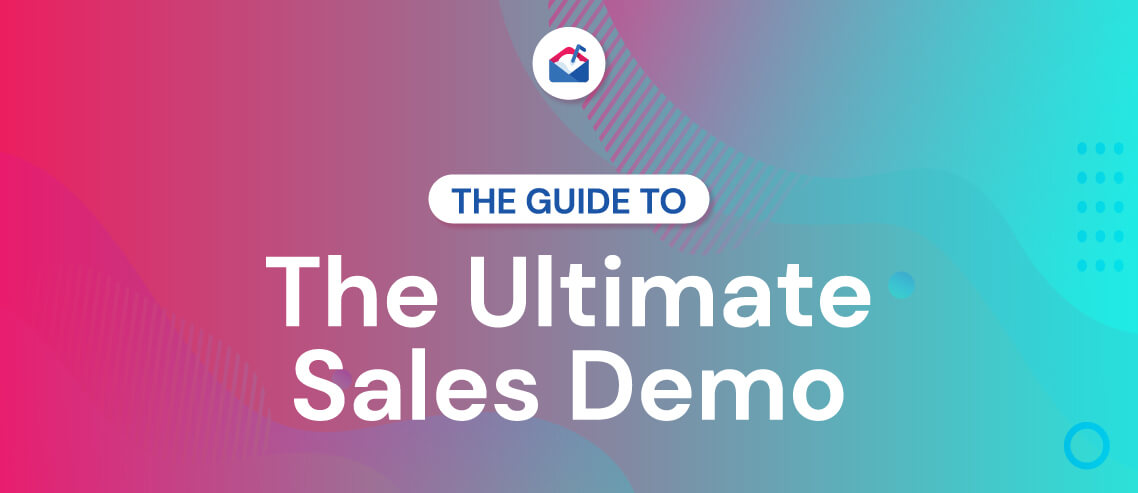Sales Incentives to Supercharge Your Growth in 2025

Contents
Pretty sure you’ve heard this one before: you’ve got to spend money to make money.
And it’s true. Kind of.
Sales incentives are absolutely vital in keeping your team motivated. And while commission is a great carrot, it’s not the only carrot.
In this post, you will learn how to motivate every type of rep with both monetary and non-monetary sales incentives.
What Are Sales Incentives?
A sales incentive program is a reward system that encourages and motivates sales representatives to reach their targets. And they carry a lot of weight.
It can be as simple as a shoutout in your next meeting or as complex as multilevel programs that offer monetary rewards for performance.
Incentives are different from compensation plans in that they are rewards or bonuses given after certain milestones have been met. This can include a gift card, a weekend getaway, or cold hard cash.
Types of Sales Incentive Programs
There’s no one-size-fits-all solution to sales incentives. Every team member is different and may require different incentives to remain motivated.
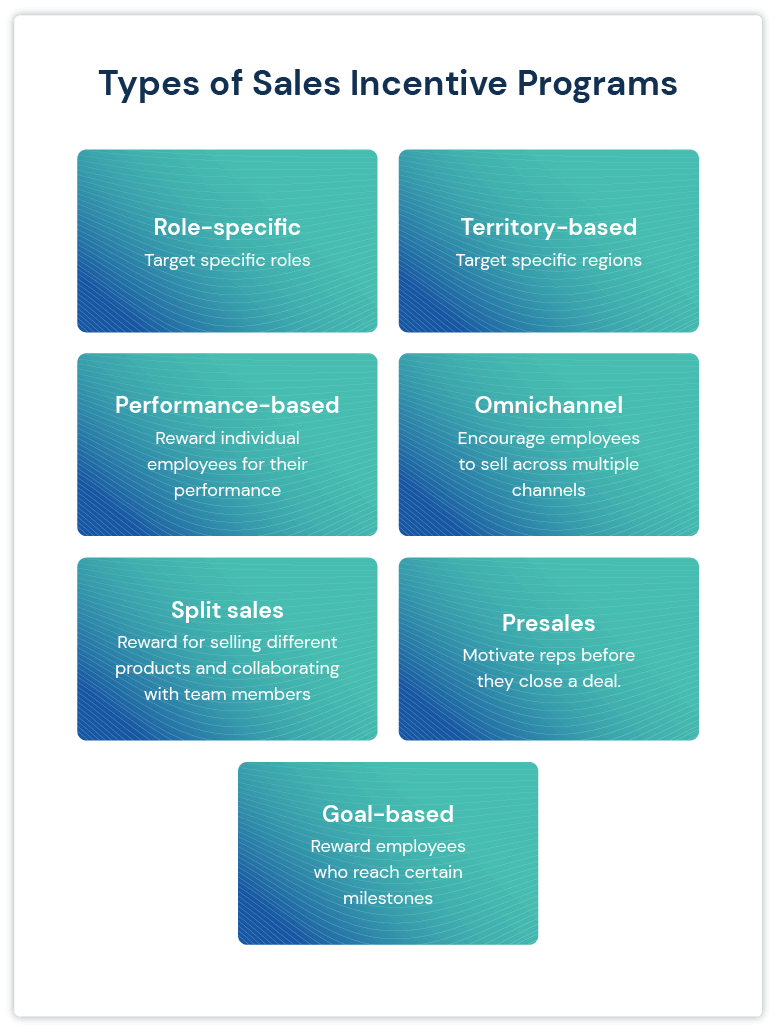
Role-Specific Sales Incentives
Role-specific sales incentives, as you might have guessed, are geared toward salespeople in specific roles. This can include sales managers, account executives, or even a customer success representative.
Role-specific incentives are great for motivating some of your most specialized team members to excel in their positions.
For example, a sales manager may receive a bonus when their team achieves their monthly sales goals, or an account executive might receive a commission on the deals they close.
Territory-Based Sales Incentives
Territory-based sales incentives are designed to reward employees who excel in a particular geographical area. This type of incentive might include bonuses or commissions based on the total amount of sales made by an individual within a designated region or country. It can also include things like travel incentives, rewards for expanding market share in a certain area, or spot bonuses for outperforming competitors.
These incentives can help increase sales in certain markets and drive growth in areas where the company doesn’t have as much presence yet.
Performance-Based Sales Incentives
Performance-based sales incentives reward employees based on their individual performance within the sales team rather than comparing them to other members of the team.
This type of incentive encourages employees to strive for excellence, as they are rewarded for meeting their own goals instead of competing against their peers.
Performance-based sales incentives can include bonuses, commissions, or even stock options to reward those who achieve their targets.
These types of incentives help increase motivation and incentivize employees to meet their quotas and goals.
Omnichannel Sales Incentives
Omnichannel sales incentives are designed to encourage sales reps to use more than one sales channel.
This type of incentive allows companies to reward employees for using multiple channels as well as tracking data from each channel to measure the effectiveness and ROI of their efforts.
Split Sales Incentives
Split sales incentives provide additional motivation for reps to focus on cross-department collaboration.
This type of program splits a portion of the total sale between different reps, providing them with additional incentives to seek out opportunities to increase customer spend.
This is especially useful if there is a significant difference in commission rates between different product categories or locations.
Presales Incentives
Presales incentives provide an additional reward for sales reps who successfully convert prospects into customers.
This type of incentive is particularly effective in situations where the up-front cost of a sale can be high, as it helps to offset some of the risk associated with such investments.
Additionally, presales incentives help to ensure that reps are investing time and energy into deals that have a higher likelihood of closing. Presales incentives are used to motivate reps before they close a deal.
Goal-Based Sales Incentives
Goal-based sales incentives are based on specific goals that need to be achieved in a certain period of time.
These goals can range from achieving a given number of sales, closing deals with particular clients, aiding in customer retention efforts, or any other goal deemed important for the success of the organization.
Goal-based incentives can be structured in different ways, such as offering a one-time bonus when a goal is reached or providing a percentage of total sales revenue earned by the rep.
How To Motivate Every Type of Rep
A sales team is only as good as its tools, so the very first step in creating a successful incentive program is to arm your team with the sales tools they need to excel. This involves training, access to updated materials, customer service support, and, most importantly, confidence in the product or service they are selling.
Sales representatives have different goals, motivations, and personalities. To maximize the effectiveness of sales incentive programs, companies need to tailor rewards to each rep’s individual needs.
Here are a few tips on how to motivate each type of sales rep:
Star Reps
Star reps are the top performers in an organization. They’re usually highly motivated and work hard to not just meet their sales goals, but also outperform their colleagues.
Stars should be rewarded for their hard work and accomplishments. Offering them access to exclusive products, services, or events are great ways to recognize their success.
Cash bonuses that come with an added bonus such as travel vouchers or tickets to special events can also help motivate stars and create a positive atmosphere in the workplace.
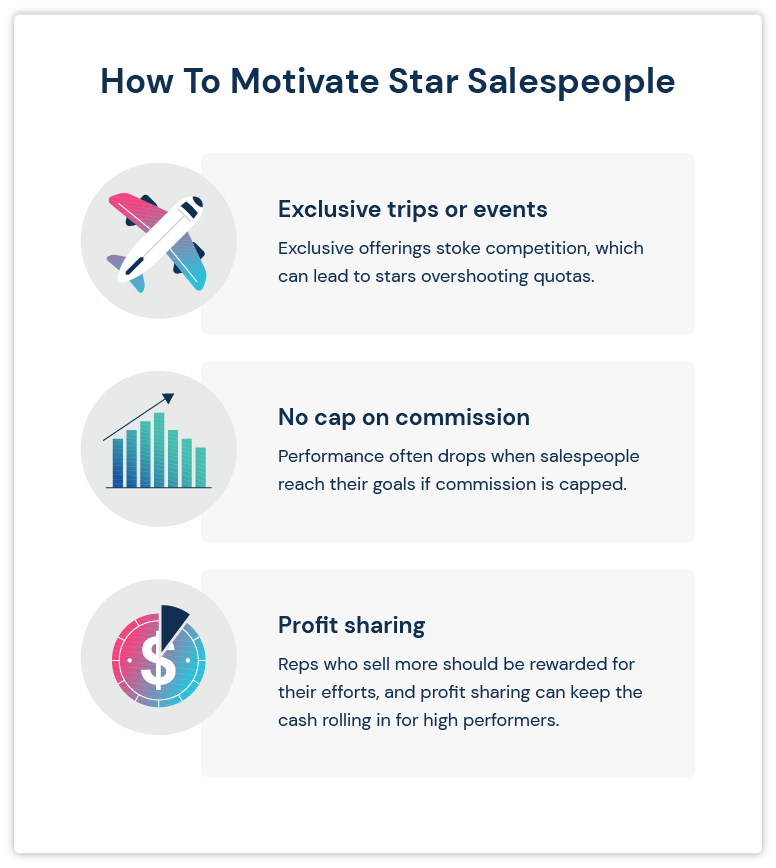
Core Performers
Core performers are consistent sales professionals who deliver steady results over time – and they should be rewarded for their consistent efforts. Offering them additional training or ongoing projects that challenge their skills can help motivate them and keep them engaged with the company.
Non-cash incentives such as flexible working hours, team events, discounts on products and services, or even a special gift could also be provided to core performers as an added bonus.
Monetary incentives work as well, especially longer-term incentives like promotion opportunities or stock options.
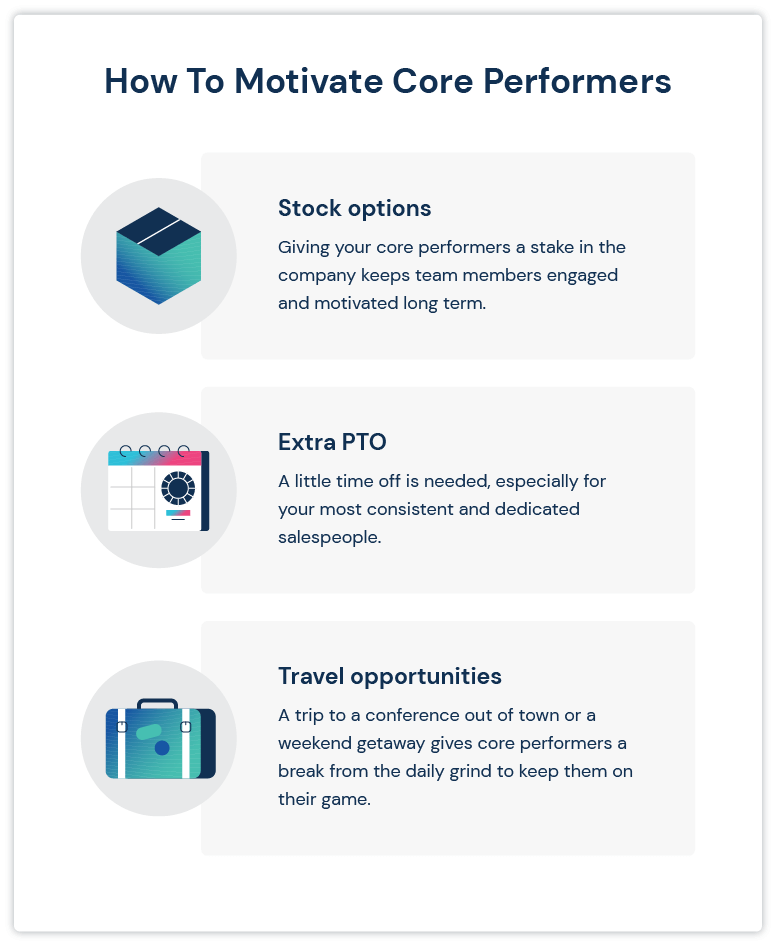
Laggards
Laggards are typically entry-level reps who struggle to meet sales targets. Laggards can benefit from incentives that are tailored to their performance.
These could come in the form of cash bonuses, additional training opportunities, or contests among other sales reps. Providing laggards with one-on-one mentoring and guidance is also a great way to motivate them.
Companies can also offer sales training and mentorship to help laggards develop their skills, so they can eventually become more successful core performers.
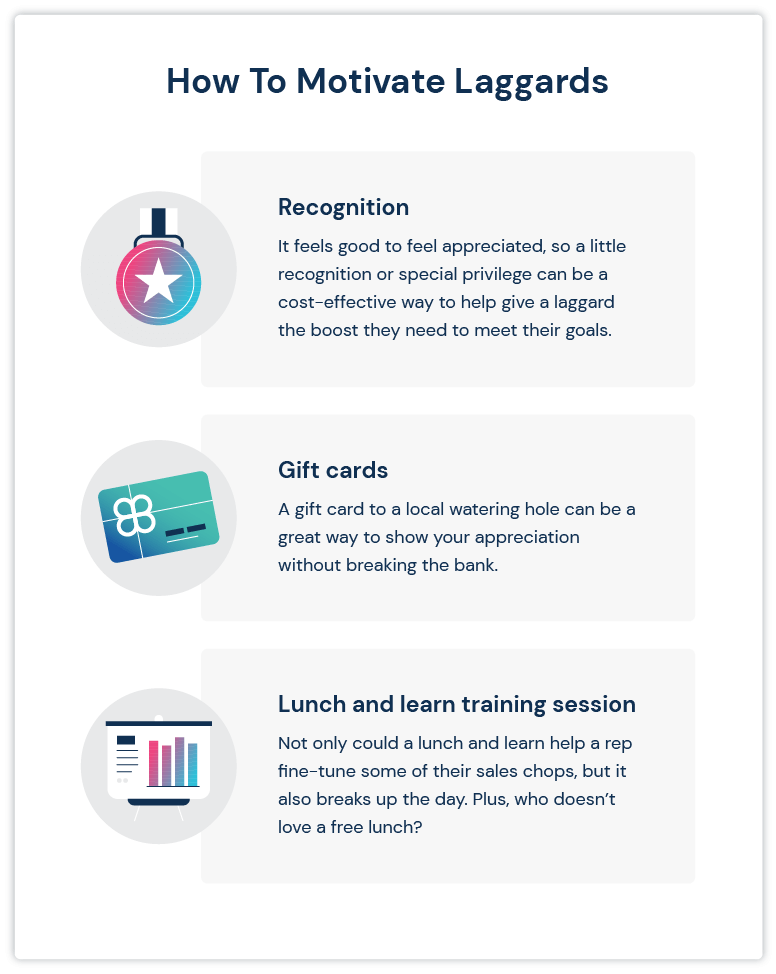
10 Sales Incentive Examples
Sales incentives come in all shapes and sizes, and should be customized to fit your specific needs and budget. Though cash is king, don’t be afraid to get creative with your incentives. You’d be surprised how far a “thank you” can go in this business.
Monetary Incentives
No one is doing the 9-5 grind for free. Obviously, more cash is a great incentive. Especially for your highest performers. But it comes at the expense of your bottom line, so it’s important to know exactly how much you can afford to give up in order to decide whether or not monetary incentives are right for you.
Profit sharing is a type of cash incentive that rewards employees for their performance. Companies split profits with employees based on a predetermined formula, often based on the number of sales made or other measurable goals achieved.
Bonuses are another type of cash incentive that can be used to motivate sales reps. Bonuses can either be individual or team-based and are typically one-time payments given out when a certain goal is met or exceeded.
Commission is a tried-and-true incentive that has withstood the test of time. Commission is a form of cash incentive that is often tied to sales performance. Sales reps receive a percentage of the total sale and can use this as motivation to close more deals. While some companies put a cap on commission to reduce costs, studies have found that it may be better to keep the commission flowing for top performers.
Stock options are a great way to reward performance for longer-term sales reps who’ve been with the company for a while. Stock options are essentially shares of stock that can be given out as rewards when sales goals are met.
Non-Monetary Incentives
A little bit of recognition goes a long way. In fact, did you know that employees who receive recognition are 73% less likely to feel burnt out? And 56% less likely to find another job?
Even when no cash is exchanged, non-monetary incentives can help keep reps feeling good about the work they’re doing. These can range from simple thank you cards or a swag bag to exclusive team events or trips.
Non-cash incentives cost companies very little, and when you consider the high price of training new employees, they can offer a pretty solid return on investment.
Recognition programs are an effective way to reward and recognize good performance in sales reps. This could include placing a top performer’s name on a plaque or certificate, publicly recognizing their achievement during a meeting, or giving them special privileges such as an expense account.
Gift cards are another non-cash incentive that can be used to reward top sales performers. Managers can give out small denominations of store gift cards or prepaid debit cards to employees who exceed performance expectations.
Travel opportunities are another fun way to keep sales teams on their toes. Offering travel opportunities to high-performing sales reps is a great way to motivate them and show appreciation for their hard work. Pro tip: Hawaii is the most desirable destination among employees polled by the Incentive Research Foundation.
Company-branded items are a non-cash incentive that can help build a sense of belonging. Giving out company merchandise such as branded apparel, mugs, and pens is another great way to reward sales reps. After all, who doesn’t love swag?
Extra PTO can be a huge incentive for salespeople, and guess what? It doesn’t cost you anything. A day off here and there can not only be a great motivator, but it can also help your top performers rest and recharge to stay on top of their game.
Special training sessions are a great way to help reps hone their skills while giving them a quick break from their outreach. Consider a catered lunch to make the session extra special.
How Do You Know if Incentives Are Working?
Sales incentives are designed to increase sales, productivity, and boost team morale.
To measure the success of an incentive program, you can look at metrics such as:
Revenue growth: Do you see an increase in sales?
Customer satisfaction scores: Are customers more satisfied with your products and services?
Employee retention rates: Are employees staying with the company longer than before?
Sales reps’ performance: How do they respond to different types of incentives?
By measuring these metrics, you can adjust your incentive program to ensure that it’s working effectively.
What Should You Consider When Developing a Sales Incentive Program?
When creating an effective sales incentive program, it’s important to consider the individual characteristics of your team members.
Factors such as age, experience level, and lifestyle should be taken into account when deciding which type of incentives will motivate them the most. You may even consider a survey for your reps about which types of rewards they prefer or find most meaningful.
And don’t forget about your own budget, either.
While a shoutout can go a long way, nothing compares to an incentive with real value – and a trip to Hawaii isn’t cheap. But don’t be discouraged. There are a lot of options, especially if you’re willing to get creative!
Consider making a deal with a travel company to get some discounted tickets or even a beloved local restaurant for a plug on gift cards.
Set Your Sales Team Up With the Tools They Need To Succeed
Remember, there’s not a simple solution that can be applied to every type of rep or every sales team. Your sales incentive plan should be built for your specific team and adjusted regularly to ensure that it continues to motivate reps into the future.
In addition to incentives, it’s also important to make sure your team is armed with the tools they need to close deals. And Mailshake is here to help.
Automated outreach and follow-ups can help your reps get in front of more potential customers, which means more wins for everyone! Schedule a demo today to see how Mailshake can help your team start selling more.




